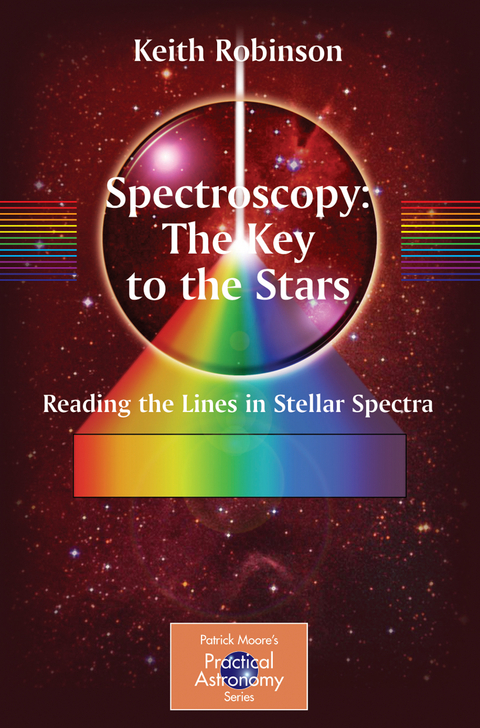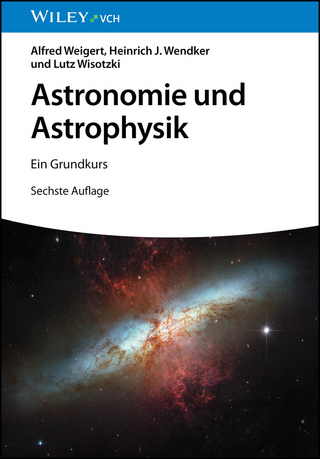
Spectroscopy: The Key to the Stars
Reading the Lines in Stellar Spectra
Seiten
2007
Springer-Verlag New York Inc.
978-0-387-36786-6 (ISBN)
Springer-Verlag New York Inc.
978-0-387-36786-6 (ISBN)
While most amateur astronomers know about the red shift, have a general idea of the way that the emission and absorption lines in stellar spectra provide an insight into the atomic processes of the star, it is unusual to find someone who has any kind of detailed knowledge. The reason isn’t lack on interest – far from it – but is because all the books currently available are pitched at professional astronomers and degree students, and are to say the least, difficult to read.
This is the first non-technical book on this subject, written specifically for practical amateur astronomers. It includes all the science necessary for a qualitative understanding of stellar spectra, but avoids a mathematical treatment which would alienate many of its intended readers.
Any amateur astronomer who carries out (or who is interested in) observational spectroscopy and who wants a non-technical account of the physical processes which determine the intensity and profile morphology of lines in stellar spectra will find this is the only book written specially for him. And of course, "armchair astronomers" who simply want to understand the physical processes which shape lines in stellar spectra will find this book equally fascinating.
This is the first non-technical book on this subject, written specifically for practical amateur astronomers. It includes all the science necessary for a qualitative understanding of stellar spectra, but avoids a mathematical treatment which would alienate many of its intended readers.
Any amateur astronomer who carries out (or who is interested in) observational spectroscopy and who wants a non-technical account of the physical processes which determine the intensity and profile morphology of lines in stellar spectra will find this is the only book written specially for him. And of course, "armchair astronomers" who simply want to understand the physical processes which shape lines in stellar spectra will find this book equally fascinating.
Keith Robinson obtained a degree in physics from the University of Lancaster, and is a Fellow of the Royal Astronomical Society.
Spectroscopy—A New Golden Age for Amateur Astronomy.- The Basic Stuff—Light Radiation and Atoms.- Behind the Lines—The Magnificent Energy Level Structure of an Atom.- Our Old Friend the Doppler Effect.- When Is a Spectral Line Not a Spectral Line?.- Stellar Spectra and That Famous Mnemonic.- Cool but not Smooth—The Molecular Spectra of Red Stars.- Glows in the Dark—Emission Lines and Nebulae.- Glowing Vortices—Accretion Disks.- The P Cygni Profile and Friends.- Spectral Magnetism—The Zeeman Effect.- ‘How Much Gold in Them There Stars?’—The Curve of Growth.
| Reihe/Serie | The Patrick Moore Practical Astronomy Series |
|---|---|
| Zusatzinfo | 87 Illustrations, black and white; XII, 160 p. 87 illus. |
| Verlagsort | New York, NY |
| Sprache | englisch |
| Maße | 155 x 235 mm |
| Themenwelt | Sachbuch/Ratgeber ► Natur / Technik ► Weltraum / Astronomie |
| Naturwissenschaften ► Physik / Astronomie ► Astronomie / Astrophysik | |
| ISBN-10 | 0-387-36786-1 / 0387367861 |
| ISBN-13 | 978-0-387-36786-6 / 9780387367866 |
| Zustand | Neuware |
| Haben Sie eine Frage zum Produkt? |
Mehr entdecken
aus dem Bereich
aus dem Bereich
Perspektiven auf die Menschheit
Buch | Hardcover (2024)
Klett-Cotta (Verlag)
CHF 34,95
auf der Suche nach neuen Planeten und außerirdischem Leben
Buch | Hardcover (2024)
Droemer (Verlag)
CHF 33,55


